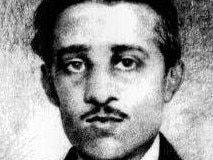Peasant’s son Gavrilo Princip set world on course for Great War
He was one of several assassins sent to kill the Archduke Franz Ferdinand, but by hitting his mark he became infamous as the man who sparked a global conflict

Today in History
Don't miss out on the headlines from Today in History. Followed categories will be added to My News.
He was a teenager only present as part of the backup plan in case something went wrong. Gavrilo Princip, 19, was in Sarajevo armed with a pistol, waiting while several comrades attempted to kill the heir to the throne of the Austro-Hungarian empire, Archduke Franz Ferdinand as he drove through the city on an official visit.
The Archduke was there on June 28, 1914, to meet with the military governor.
The murder plot by Princip and his revolutionary compatriots was planned partly to protest Austria’s annexation of Bosnia in 1908. But they were also concerned that if the Archduke took the throne he would introduce reforms that would take the fuel out of their revolutionary fire and thwart their aim to unite the Slavic people in an independent nation.
When one assassin lost heart and failed to throw his bomb, another, Nedeljko Cabrinovic, lobbed a grenade that missed its mark but injured the occupants of a car travelling behind the Archduke, along with several spectators.
Cabrinovic then took a faulty suicide pill, which only made him ill, and tried to drown himself in a river that was only 10cm deep, before he was apprehended by the crowd, beaten and handed over to the police.
Meanwhile, the Archduke’s car sped up preventing Princip and the other revolutionaries from taking a shot. So Princip moved to a new position outside a sandwich shop, hoping for another chance.

The Archduke stuck to his schedule, giving a speech at the town hall, but added a visit to the hospital where those injured by the bomb were being treated. The route of the return journey was changed to foil any more plots, but the driver made a wrong turn taking the car directly past Princip, who seizing his chance, shot the Archduke and his wife, Sophie.
Princip, born 125 years ago today, had no idea that, with his actions, he would spark a global conflict. He was hoping for independence for the Slavs and the formation of a Slavic republic, free of oppression by the Ottomans or the Austro-Hungarian empire.
To many he became a villain for having set in motion the chain of events that resulted in the deaths of millions, but to some others he was a hero who struck a blow against imperialism.
He was born on July 25, 1894, in the village of Obljaj, in what is today Bosnia and Herzegovina, but was then part of an area of the Balkans under.
His parents, Petar and Marija, were poor Serb farmers, but Petar became the local postman, a position of some standing. Gavrilo was the second of nine children, only three of whom survived to adulthood. A sickly child, who remained small, he always felt the need to prove he was no weakling.

Against his father’s wishes Princip was sent to school at the age of nine. He became a good student and was sent to Sarajevo to be enrolled in a military school, but went instead to
an ordinary secondary school favoured by rich merchants.
He was soon outdoing more affluent students, but was also absorbing new ideas on Slavic independence and anti-imperialism, mixing with students who resented Austria-Hungary’s annexation of Bosnia.
He joined a political group and was expelled in 1912 for taking part in an anti-Austrian demonstration.
Travelling to Belgrade, in Serbia, he was rejected for service with the Serbian paramilitary group Ujedinjenje Ili Smrt (meaning “Union or Death”), better known as the “Black Hand”. Instead he was trained by Serbian Chetnik revolutionaries.

Returning to Sarajevo in 1913 he was there when the Austro-Hungarian military governor of Bosnia, General Oskar Potiorek, declared martial law, dissolving the country’s parliament and cracking down on Slavic cultural institutions. Princip and a group of like-minded revolutionaries from the Mlada Bosna (Young Bosnia) organisation, armed themselves
and prepared to take action when the moment arose.
It came in June 1914 when the heir to the throne of the Austro-Hungarian empire, nephew of the Emperor Franz Joseph, was scheduled to visit Sarajevo.
Princip later claimed he was aiming at Potiorek but hit the Archduke and his wife. He was quickly arrested.
Put on trial later that year he was found guilty of the murder, but at 19 was too young to receive the death penalty. Imprisoned at Terezin Fortress in Bohemia, he was poorly fed because of the war he had set in motion.
Tuberculosis, most likely contracted before the assassination, ravaged his body, resulting in the amputation of his arm, and his death on April 28, 1918.

